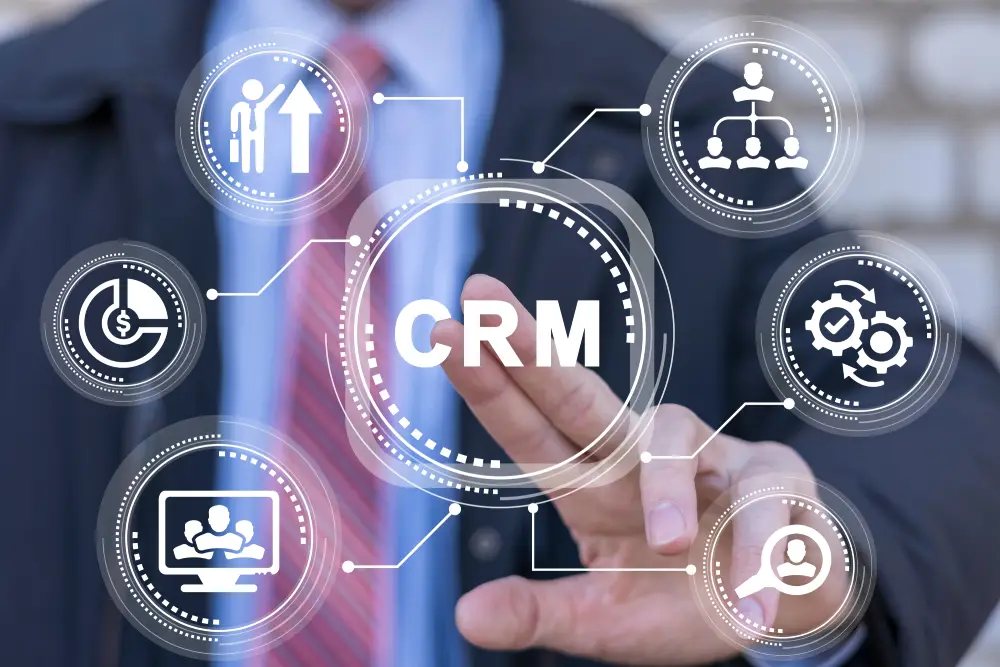
Designed to make complex sales cycles simpler to track and convert, Customer Relationship Management (CRM) softwares are core pieces of kit for businesses globally. Whether you’re a start-up, SME or enterprise business, CRMs eliminate the need for messy or inconsistent spreadsheets and remove much of the admin out of your sales team’s day-to-day. This means salespeople spending more time on building lasting connections with their leads and prospects, ultimately leading to higher conversion rates and better customer relationships. But we’re getting ahead of ourselves – let’s break down the key functions and use cases of CRMs and discuss the benefits that can be availed by those who embrace these game-changing software.

How do CRMs work?
By and large, CRMs
operate by visualising the sales funnel from awareness, interest and
consideration all the way through to conversion and advocacy by organising your
leads into the respective categories when they pass key moments in the sales
cycle. They also store key information on your leads to enable retargeting for
lost sales and data insights into which customer profiles are closing and which
ones aren’t quite the right fit. There are plenty of CRMs on the market, and
each one will have features that are better suited to different styles of
businesses.
Hubspot, for instance, can be tailored to suit
anything from a small business implementing a CRM for the first time, to
established SMEs that are ironing out their sales operations. With tools
ranging from landing page creation to insight-led automated communications,
Hubspot extends further than traditional sales funnel model, offering critical
tools for businesses focused on growth. Other CRMs, like Salesforce, are designed for enterprise-level businesses dealing with multifaceted
sales and customer journeys that span different departments, and have a suite
of integrated add-ons for different operational functions like finance and HR.

Why do businesses
implement CRM systems?
While only 24% of surveyed businesses said that their motivation for
implementing a CRM was to increase sales revenue, 58% quoted that increased
sales revenue was the most significant benefit of implementing their CRM
system. It’s clear that businesses that invest in developing their customer
relationships win out in the long term as 53% of those surveyed quoted improved
customer satisfaction and retention as a result of implementing their CRM
system.
A fascinating study highlighted that the main priority of growing
small & medium businesses in 2024 was improving customer experience, as
opposed to declining and stagnant businesses that prioritised acquiring new clients
over improving experience. So although the motivation for CRM adoption for the
24% of businesses we mentioned earlier was increased sales, they had the right
approach to ultimately achieve their targets by centralising customer
experience.

Signs that your business would benefit from a CRM
All of us will have been on at least one side of a sales cycle gone cold at one time or another. Whether it’s enquiring about a reservation and never hearing back or a lead slipping through the cracks when you’re rushed off your feet, losing out on potential business is irritating for all involved. If any of the scenarios below are familiar to you, it’s probably time to look into a CRM system.
Silos between marketing, sales and account services
It’s a tale as old as time that marketing and sales can be at loggerheads in business. Marketing brings leads in and sales argue that the leads aren’t high quality. Not to mention once the sales close and it’s account management’s job to keep everyone happy and retention high. Most of the time, these frustrations stem from a lack of communication between departments. And it’s not only frustrating internally - your leads and customers feel it too.
Salesforce research indicates that in 2024, 19% of customers trust companies less than the previous year. 35% of these customers noted that consistent service and product quality helps to improve their trust in a company. Ensuring that your messaging and service is consistent from a lead’s very first touchpoint into the sales cycle is a huge challenge that CRMs are designed to tackle. By having your marketing channels flow seamlessly into your CRM, you enable consistent communication between departments instantly. Your sales team will be able to clearly see the channel by which a lead has enquired, and benefit from the insights collected in the CRM regarding the campaign, product or service that piqued the lead’s interest. Sales can then tailor their approach using this data to improve qualification rates. Throughout the sales journey, sales can store all of their discussion points neatly within the customer profiles on the CRM to hand over this information to account management once closed.
Lost or mismanaged leads eating away at the bottom line
We’ve touched on leads getting lost in spreadsheets, inboxes and different messaging platforms, but it’s important to drive home just how much businesses leave on the table with disorganised sales processes. When dealing with high lead volumes it’s easy to let leads go cold from inefficient workflows and slow follow ups.
Having a CRM to automatically organise your leads clears piles of admin from your sales teams desk, but the capabilities of CRMs go far beyond what you can achieve with your self-built Google Sheet.Salesforce reported that sales productivity increases by an average of 30% by utilising a CRM and with the suite of features available in most CRMs, it’s easy to see why. Automated email threads can keep leads warm between sales touchpoints, automatic categorisation can help your sales team to prioritise which prospect to chase and email inbox integrations can seamlessly keep tabs on all communications so nothing gets lost. It’s simple, let your CRM do the admin so you can focus on building human relationships with your leads.

CRM benefits for different business models
SaaS & recruitment
Typically, service-based B2B businesses navigate longer sales cycles and approach their leads from multiple angles before securing discovery calls and demos. Keeping leads warm when the timing isn’t quite right for them to convert, or when they’re waiting for budget approvals is a marathon, not a sprint. Salespeople need to pace themselves if they’re wanting their prospects to cross the finish line. We’ll stop the sports metaphors here – but you get the point. According to research, 86% of businesses that utilise CRMs hit or exceed their sales targets. Especially with longer sales cycles and high volumes of leads, B2B businesses simply function better when using a CRM to help salespeople to nurture leads through the sales cycle.
Having all of your lead’s information to hand in one system makes it that much simpler when you receive a call from a lead to finally say ‘it’s go time’. No more frantic scrolling through Google Drives to find the information for a specific deal - simply search for your lead’s name or company in the CRM and you’ll have your entire communication history at your fingertips. CRMs are also handy when you’re mid way through a sale to let others in your company know to not contact or interfere with a live process.
Tailoring & luxury
Typically, B2C lead-based businesses benefit from inbound leads with higher levels of intent. For this reason, many of these businesses focus on marketing efforts like SEO & PPC to drive users to enquire directly. However, with an increase in enquiries comes the challenge of managing a high volume of interested leads.
When our client You & I Bridal saw an increase in enquiries surpassing hundreds per month from their SEO campaign, it became a challenge to keep track of each individual lead. A CRM enables businesses to automate enquiry acknowledgement emails, automatically sends salespeople reminders to chase enquiries, and enables personalised ongoing outreach using the data collected in the system. This helps to keep your leads warm whilst you’re catching your breath.
Real estate
It is said that moving homes is one of the most stressful experiences people will have in their lives, so ensuring customer experience in real estate agencies is paramount. When we look at the other side of the transaction, the complexities of real estate agents' portfolios and sales cycles are vast. Properties advertised on multiple listing platforms and websites, high lead volumes, and each lead being interested in multiple listings - it’s a mammoth task to ensure a personal approach without a powerhouse CRM.
McKinsey research states that real-estate businesses with a focus on customer experience throughout the sales process see a 15% uptick in performance vs. their competitors. Harnessing details like the tenant’s birthday or their pet’s name to offer higher levels of personalisation not only increases close rates of deals, but increases the perceived value of the property (leading to higher top line revenue). With an effective CRM, real estate agents can keep all of their notes on each lead organised and utilise personalisable templates to take the heavy lifting out of their relationship management.

Utilising your CRM for marketing & sales feedback loops
Internal feedback loops in any business are crucial for refining your offering, operations and services, but often collating the information to provide evidence-based feedback over gut feelings can prove an arduous task reserved for annual or bi-annual review meetings. With a CRM, sales teams can easily identify which marketing channels bring in leads of different values and close rates. Hubspot, for instance, can create invaluable customisable dashboards which seamlessly display information from each stage of the sales and marketing cycles. This makes it easier for teams to communicate internally on core metrics, and collaborate on where to focus their efforts or shift resources towards high-performing lead sources. Not only this, sales can use dashboards to highlight the common issues that leads discuss throughout the sales journey, making it easier for marketing to refine the messaging across ad copies and landing pages. Using a CRM to collaborate internally centralises customer experience across marketing and sales, leading to improved conversion and retention.

What you’ll need to invest to implement a CRM
Effective training for your team
If your team doesn't know how to get the most out of your CRM, they’re not going to utilise it to its fullest capabilities. 24.7% of businesses surveyed said that team adoption was the biggest challenge of implementing a CRM. Whether it’s a reluctance to adapt or an issue with tech-literacy, ensuring that your team understands how to best utilise the tools available to them will improve your ROI on the software.
Refined operational systems
Many businesses that are implementing a CRM for the first time don’t have a clear-cut sales journey defined in their operations. This is a crucial step in ensuring your CRM functions in the way that works for your business. Hubspot offers insightful guidance on how to refine these processes to maximise the impact of CRM implementation, and ensure its seamless adoption.
Financial investment
Depending on your needs and the CRM you opt for, the financial investment of implementing a new system will vary. Hubspot offers a free CRM structure that’s ideal for start-ups that are still defining their processes, all the way through to enterprise platforms for $3,000 per month. Alternatively, Salesforce offers price-per-seat packages ranging from €25-€500 per seat. Just be wary that this could add up fast – if your business has a team of 50 users on Salesforce’s enterprise CRM plan, this would add up to an eye-watering €8,250 per month. Our advice? Think carefully about your main business pain-points, and which features you would need in your CRM to tackle those. From there, you can pick a CRM package that suits the needs of your business now, and can grow with you.
Need help setting up a CRM?
73% of businesses in 2024 currently use a CRM, but that still leaves over 30% without access to the insights and capabilities a CRM can bring. If you’re one of the 31%, there’s no better time to unlock the information a CRM can bring together for your business. At United SEO, we’re on a mission to make sure that businesses make the most of the leads generated from their marketing efforts. Contact us to discover how we can support your CRM adoption with Hubspot.










 6 min read
6 min read




